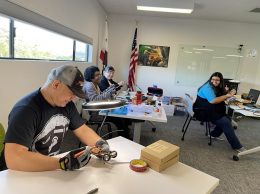Cunningham, Ortiz-Legg vie for Assembly seat
Editor’s note: The Pacific Coast Business Times chose five contested tri-county races in the November election to feature in a Q&A format. Each candidate was asked the same four questions about business, housing and the economy.
Jordan Cunningham is the Republican candidate and Dawn Ortiz-Legg is the Democratic candidate for the 35th District Assembly seat.
Jordan Cunningham
Age: 38
Residence: Templeton
Family: Married, four children
Occupation: Owns Cunningham Law Group
Education: Bachelor’s degree, Point Loma Nazarene University; law degree, University of California, Berkeley
With the new minimum wage law, new regulations and higher taxes, there are rising complaints that California doesn’t have a friendly business environment. How would you change that?
Cunningham: California has earned its reputation as a difficult state in which to do business. Just look at the number of major employers that have moved east. Whether it’s cost of living, our regulatory system, or the legislature’s affinity for taxes, they are pushing opportunity away from our state.
As a former deputy district attorney and small business owner, I have an extensive understanding of our state’s regulatory system and numerous ideas on how to fix these problems. Currently, we are visiting 50 businesses in 50 days and will be publicizing a detailed plan for job growth in the near future.
The high cost of housing is making it hard for employers to attract and retain high quality, skilled employees. How would you ease the housing crunch for working families?
Cunningham: It’s simple; we must find the middle ground when it comes to the construction of new, affordable housing and the costs associated with environmental regulations and permitting. Although taking care of our environment is extremely important, we have allowed the system to be manipulated by special interests.
This is why it is imperative that we once again find balance in our state legislature and, when elected, I plan to work on both sides of the aisle to ensure we are taking a pragmatic approach to the issues.
Times are good now and unemployment is low. But the good times won’t last forever. How would you help businesses prepare for the next recession and get through it? How does government cost factor into your solutions?
Cunningham: Saying times are good and unemployment is low paints a misleading picture of California. Sure, unemployment is down overall. But middle class jobs across the state are the ones on their way out and people are taking menial, low-income jobs that is leading to a large underemployed population.
With examples like the Toyota factory in Torrance leaving the state, or the Diablo Canyon Power Plant shutting down on the Central Coast, families are currently losing middle class jobs throughout California. We need to entice California businesses to stay, instead of chasing our manufacturing base out with bad policies from Sacramento.
How do you strike a balance between our legacy of environmental leadership and economic development on the Central Coast?
Cunningham: We can accomplish this goal by electing leaders who are committed to striking a balance, analyzing cost/benefit, holding unelected bureaucrats accountable, and insisting on sound scientific underpinnings for all proposed regulations. Too often, Sacramento passes regulations to try and solve a problem but there is no follow-up to see if they actually worked. Instead of eliminating and replacing regulations that are ineffective, politicians instead layer regulations on top of each other, costing the business more and more money. A sunset clause is needed on fees and regulations that are ineffective or no longer relevant.
Dawn Ortiz-Legg
Age: 57
Residence: San Luis Obispo
Family: Married, one daughter
Occupation: Solar energy contractor
Education: Bachelor’s degree, Pepperdine University; master’s degree in international public policy, Johns Hopkins School of Advanced International Studies
With the new minimum wage law, new regulations and higher taxes, there are rising complaints that California doesn’t have a friendly business environment. How would you change that?
Ortiz-Legg: First and foremost, I would put a hold on new state taxes — we can’t tax our way to prosperity. In addition, I have a three-point job plan that focuses on retraining our workforce and building strong infrastructure and housing to create a more business-friendly environment.
My experience creating jobs when working on large-scale solar projects is what we need in order to retain businesses and enjoy more economic prosperity in our region. It is also my goal to find comprehensive reform through legislative oversight and review to improve business environment by cutting costs and overhead.
The high cost of housing is making it hard for employers to attract and retain high quality, skilled employees. How would you ease the housing crunch for working families?
Ortiz-Legg: Housing is an economic justice issue. We need to coordinate a macro planning and housing policy. There are solutions, here are a few: revise the traffic analysis required for developments; provide incentives for redevelopment of commercial zones with mixed housing, zone and pre-plan adequately-sized residential land; state and local jurisdictions must address infrastructure as a necessary component to affordability of developments.
Times are good now and unemployment is low. But the good times won’t last forever. How would you help businesses prepare for the next recession and get through it? How does government cost factor into your solutions?
Ortiz-Legg: In order to prepare for economic downturns, we need expansions in the following areas: broadband for business and education; regional airports linking us to markets; training programs and institutions that meet 21st century worker needs.
I also believe in open markets for our agricultural and technology industries. Investment in infrastructure must happen for it means jobs, improved efficiencies in movement of people and goods, water and clean energy projects. These can be done with private and public partnerships. It will also be my goal to find cost reductions to help our small businesses thrive in good times and bad.
How do you strike a balance between our legacy of environmental leadership and economic development on the Central Coast?
Ortiz-Legg: Building trust comes from professionalism, outreach and cooperation — leading to better projects. I know how economic development and environmental leadership can work hand in hand to produce positive economic and environmental results. Topaz Solar Farms created 400 jobs, added over $425 million in benefits to local businesses and provides enough energy to power 180,000 California homes annually. I would like to see more of these relationships take place in the Central Coast so that everyone benefits — the economy, environment and the people in our region.











